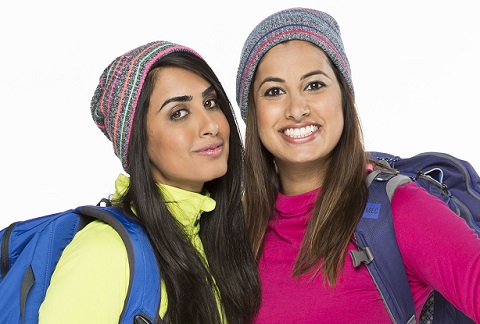The reality TV show The Amazing Race is a gruelling contest. Over the course of a month, teams of two follow clues to destinations around the world, completing challenges along the way (such as performing a folk dance in Russia or eating four pounds of meat in Argentina) all while being filmed. But for contestants Nabeela Barday (BBA 2007) and Shahla Kara, there was an added pressure. While participating in The Amazing Race Canada, the two women wanted to be examples for their faith, Islam.
“There isn’t just the radical version of Islam that some may come to know,” says Barday. There is also a very moderate version, and there’s so many people like us out there who are practicing it. We’re praying, we’re fasting, we’re adherent to our beliefs, we’re also very open-minded and we don’t practice hijab. We said we want to represent that, to show people this moderate, day-to-day aspect exists.”
Still, moderate Islam does have requirements. What if two practicing Muslims had to face that Argentinian meat challenge? “Halal food is Islamically slaughtered meat,” explains Barday. “It’s a method that is meant to induce the least pain to the animals as possible. That is the only meat we consume.” The pair says they coped on the race by either searching out halal food or going vegetarian – and though Barday can’t reveal yet if anything like the meat challenge happened to them, they would have had to take a time penalty.
As for prayer, the two lived up to their moderate approach. “We pray five times a day,” says Barday. “So this one was tricky for us. We asked, would we stop to say our prayers if we were racing during prayer time? We agreed that if we thought we were in a significant lead, we would.” She laughs. “And if not, we would just make up the prayers at the end of the race. I’m like: God understands!”
The pressure to be examples for their religion was huge. “I have to be careful about what I’m saying, what I’m doing,” explains Barday, “being cognizant that it’s reflective not just of myself, but also my upbringing and my community as well.” The two are also aware there is a potential to receive negative attention from people perhaps unsatisfied with their observance of Islam . All this while keeping an eye on their competitors and navigating exhaustion, hunger, and airline bureaucracy.
Fortunately, the pair had lots of positives in their corner. Between them, they speak five languages: English, French, Spanish, Gujarati and Hindi. “Arabic I can read and write, but I actually don’t understand it,” says Barday. “I don’t think that counts!” The two also drew on their 20-year friendship, which began in Sunday morning kids classes at their mosque. And their mosque community has been behind them all the way. “There have been women coming up to me and saying, ‘That is awesome what you did,’” says Barday, clearly moved. “We are representing a lot of other folks that we know fall into this category of Islam – we don’t veil ourselves, we wear fitted clothes. They say, ‘You represent what it is that I want and I aspire to.’” She planned to watch the opening episode of the show early in July with family and friends and expected it to be quite a party – happily, the show debuted just as everyone broke their Ramadan fast for the day.
While a student at UTSC, Barday wore a headscarf. However, she now works as a management consultant, and she often has to attend events in bars, or where alcohol (also forbidden for Muslims) is served. “It felt weird to be wearing the hijab in those types of environments,” she explains. “I love the hijab, I love what it represents, but I also want to be able to represent it the right way. For me, I can still observe the modesty yet I don’t necessarily need that external cloth. Though I do hope that one day I’ll be able to wear it again.”
Asked what she learned from competing on the race, Barday takes a moment to think. “Sometimes, we underestimate our abilities to achieve certain things,” she says. “It’s only when you put yourself out there, that the potential is realized as to whether you can achieve it or not. Sometimes you’ve got to push yourself out of your comfort zone a bit… and you’ll be surprised . It’s been a great experience!”
Recent Posts
U of T’s 197th Birthday Quiz
Test your knowledge of all things U of T in honour of the university’s 197th anniversary on March 15!
Are Cold Plunges Good for You?
Research suggests they are, in three ways
Work Has Changed. So Have the Qualities of Good Leadership
Rapid shifts in everything from technology to employee expectations are pressuring leaders to constantly adapt





